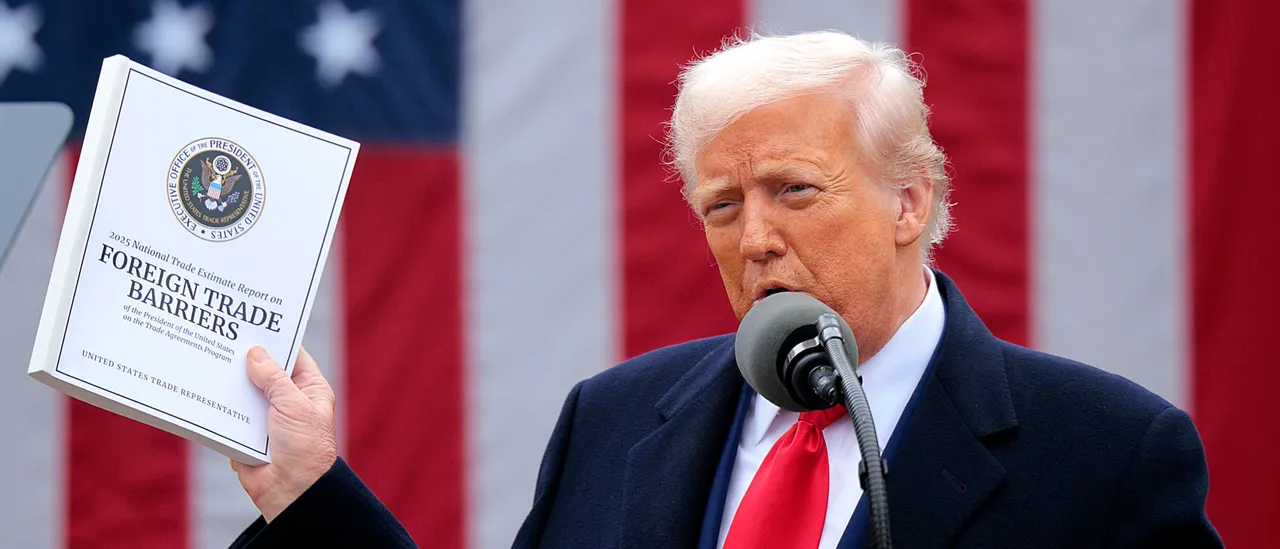Business
Trump’s Trade Policy Sparks Debate on Economic Principles

The ongoing trade policy of former President Donald Trump has ignited a significant debate among economists and analysts regarding its implications for the global economy. Recent reports highlight that the U.S. government collected approximately $27 billion in tariff revenue in June alone, leading to an unexpected surplus for that month. This financial outcome raises questions about traditional economic theories that advocate for free trade and oppose tariffs.
According to the Financial Times, Trump’s administration has generated substantial tariff income, leading some commentators to suggest that the U.S. is reaping benefits while other countries hesitate to retaliate. The publication noted that only China and Canada have responded to Trump’s tariff initiatives, emphasizing the unique position of the U.S. in the global marketplace. The response from various media outlets reflects differing perspectives on this trade strategy, with some emphasizing the economic advantages for the U.S. while others express skepticism.
One analysis from Axios highlights the economic narrative that in a Trump-led global economy, the U.S. stands to gain significantly. They suggest that Trump’s approach to trade emphasizes negotiating access to the American market, which remains a vital outlet for goods from other nations. The U.S. trade deficit, projected to exceed $918 billion in 2024, underscores the dependency of many economies on access to American consumers.
Economic Impacts and Negotiation Tactics
Trump’s strategy appears to deviate from conventional economic wisdom, where tariffs are often deemed detrimental. Instead, he views trade negotiations as opportunities to leverage the U.S. market’s size and wealth. His administration has established a deal with the European Union, which imposes a 15% tariff on most EU goods. While this tariff offers some protection for American industries, it remains low enough to allow foreign companies to remain competitive in the U.S. market.
The proposed agreement also includes a plan for the EU to invest $600 billion in the United States, along with commitments to purchase more energy and military equipment from American producers. This approach suggests that Trump is crafting trade policies that prioritize U.S. interests while still facilitating international commerce.
For many European businesses, accessing the American market is a lucrative opportunity, making the 15% tariff seem like a reasonable cost of doing business. American firms, meanwhile, are encouraged to recognize the potential benefits of investing domestically, as they stand to gain from a market eager for their goods and services.
The dynamics of this trade war appear to result in a net positive for American consumers, as competition drives prices down and increases choice. The modest protective measures in place are designed to foster an environment where American industries can thrive while still accommodating foreign competition.
As the Trump administration continues to navigate its trade policies, the long-term effects on both the U.S. economy and the global trade landscape remain to be fully understood. Economists may need to reevaluate their perspectives on tariffs and trade as the realities of Trump’s economic approach continue to unfold. The dialogue surrounding these issues is crucial for shaping future trade relations and understanding the evolving nature of global economics.
In this context, the perspective of individuals like Daniel McCarthy, editor of Modern Age: A Conservative Review, becomes significant. McCarthy argues that Trump’s trade lessons challenge established economic narratives and prompt a reconsideration of how trade negotiations are conducted in the modern era. Whether these policies will yield sustainable benefits for the American economy remains a topic of considerable debate among experts and policymakers.
-

 Lifestyle3 months ago
Lifestyle3 months agoLibraries Challenge Rising E-Book Costs Amid Growing Demand
-

 Sports3 months ago
Sports3 months agoTyreek Hill Responds to Tua Tagovailoa’s Comments on Team Dynamics
-

 Sports3 months ago
Sports3 months agoLiverpool Secures Agreement to Sign Young Striker Will Wright
-

 Lifestyle3 months ago
Lifestyle3 months agoSave Your Split Tomatoes: Expert Tips for Gardeners
-

 Lifestyle3 months ago
Lifestyle3 months agoPrincess Beatrice’s Daughter Athena Joins Siblings at London Parade
-

 World3 months ago
World3 months agoWinter Storms Lash New South Wales with Snow, Flood Risks
-

 Science3 months ago
Science3 months agoTrump Administration Moves to Repeal Key Climate Regulation
-

 Science2 months ago
Science2 months agoSan Francisco Hosts Unique Contest to Identify “Performative Males”
-

 Business3 months ago
Business3 months agoSoFi Technologies Shares Slip 2% Following Insider Stock Sale
-

 Science3 months ago
Science3 months agoNew Tool Reveals Link Between Horse Coat Condition and Parasites
-

 Sports3 months ago
Sports3 months agoElon Musk Sculpture Travels From Utah to Yosemite National Park
-

 Science3 months ago
Science3 months agoNew Study Confirms Humans Transported Stonehenge Bluestones









